
The International Olympiad in Informatics (IOI) is an annual competitive programming and one of the International Science Olympiads for secondary school students. It is the second largest science olympiad, after International Mathematical Olympiad, in terms of number of participating countries. The first IOI was held in 1989 in Pravetz, Bulgaria.
Iteration is the repetition of a process in order to generate a sequence of outcomes. Each repetition of the process is a single iteration, and the outcome of each iteration is then the starting point of the next iteration.
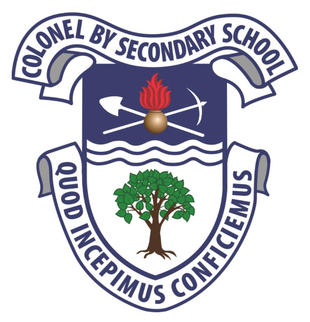
Colonel By Secondary School is an Ottawa-Carleton District School Board high school. It is located in the Beacon Hill neighbourhood of Gloucester in the city of Ottawa, Ontario, Canada. It is a non-semestered school, and was the only English public school in Ottawa that offers the International Baccalaureate (IB) diploma programme until Merivale High School began its IB programme in September 2019. Colonel By is renowned locally and provincially as an academically rigorous school. In the 2018–19 school year, it was ranked the sixth best secondary school in Ontario by the Fraser Institute.
The United Kingdom Mathematics Trust (UKMT) is a charity founded in 1996 to help with the education of children in mathematics within the UK.
Hong Kong Olympiad in Informatics is an annual programming competition for secondary school students in Hong Kong, emphasizing on problem solving techniques and programming skills. It is co-organized by the Hong Kong Association for Computer Education (HKACE) and the Hong Kong Education Bureau (EDB). It serves as a preliminary contest to international, national and regional competitions such as the China National Olympiad in Informatics (NOI) and the International Olympiad in Informatics (IOI). The first HKOI was held in 1997.
The American Mathematics Competitions (AMC) are the first of a series of competitions in secondary school mathematics that determine the United States team for the International Mathematical Olympiad (IMO). The selection process takes place over the course of roughly four stages. At the last stage, the Mathematical Olympiad Summer Program (MOP), the United States coaches select six members to form the IMO team. The United States Math Team of 1994 is the first of the only two teams ever to achieve a perfect score, and is colloquially known as the "dream team".
The United States of America Computing Olympiad (USACO) is an online computer programming competition, which serves as qualification for the International Olympiad in Informatics (IOI) in the United States of America. Primarily for secondary school students in the United States, the USACO offers four competitions during the academic year. Participants compete in four increasingly difficult divisions, each of which is provided a distinct set of 3 solvable competitive programming problems during each contest. Coding & submitting computer programs can be done in one of four languages: C, C++, Java, and Python. Competitors begin in the Bronze division, and advance through the levels by performing well in their current division.
The Centre for Education in Mathematics and Computing (CEMC) is a Canadian educational organization dedicated to promoting and creating activities and materials in mathematics and computer science. Founded in 1995 with origins dating back to the 1960s, it is housed within the Faculty of Mathematics at the University of Waterloo. Its mission is to increase interest, enjoyment, confidence, and ability in mathematics and computer science among learners and educators.

Woburn Collegiate Institute is a non-semestered, English-language public secondary school on Ellesmere Road in the Woburn neighbourhood of the Scarborough district of Toronto, Ontario, Canada operated by the Toronto District School Board. From its inception in 1963 until 1998, it was operated by the Scarborough Board of Education.
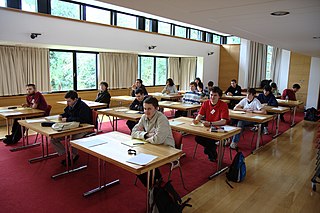
The British Informatics Olympiad (BIO) is an annual computer-programming competition for secondary and sixth-form students. Any student under 19 who is in full-time pre-university education and resident in mainland Britain is eligible to compete. The competition is composed of two rounds - a preliminary 3-question, 3-hour exam paper sat at the participant's school and a final round. The top-15 performing students each year are invited to the finals where they attempt to solve several more difficult problems, some written, some involving programming. Typically a score of 70 to 80 out of 100 is required on the first round of the competition to reach the final.
The South African Computing Olympiad (SACO) is an annual computer programming competition for secondary school students in South Africa. The South African team for the International Olympiad in Informatics is selected through it.

Zion Heights Junior High School was an intermediate school for students in Grade 7 to Grade 9 in the north-eastern end of Toronto, Ontario, Canada. It was opened in 1969 by the North York Board of Education, and is currently owned and operated by its successor, the Toronto District School Board.
The Indian Computing Olympiad is an annual computer programming competition that selects four participants to represent India at the International Olympiad in Informatics. ICO is conducted by the Indian Association for Research in Computing Science. The competition is held in three stages. For the first stage, students may compete in the Zonal Computing Olympiad, or the Zonal Informatics Olympiad. The following two rounds are the Indian National Olympiad in Informatics and the International Olympiad in Informatics Training Camp.
This article describes the selection process, by country, for entrance into the International Mathematical Olympiad.
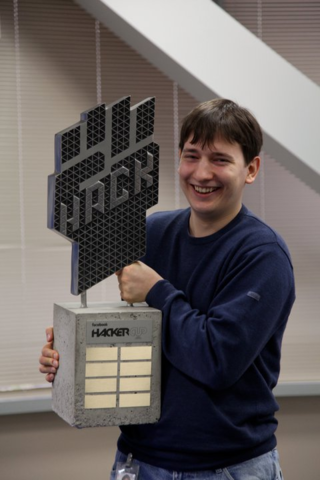
Petr Mitrichev is a Russian competitive programmer who has won multiple major international competitions. His accomplishments include gold and silver (2001) medals in the IOI, gold medals in the ACM ICPC World Finals as part of the team of Moscow State University and winning Google Code Jam (2006), the Topcoder Open, the Topcoder Collegiate Challenge, Facebook Hacker Cup as well as numerous national and online contests. He has achieved the highest rating ever among the Algorithm competitors of Topcoder and consistently ranks in the top two of the world. He is the second highest rated Algorithm coder on Topcoder ratings as of February 2021. He currently works at Google on the search engine and helps to prepare Code Jam.
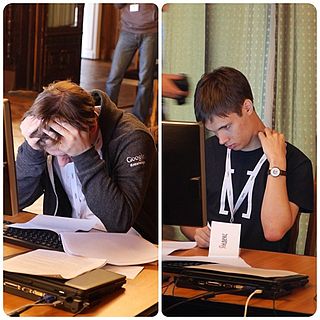
Competitive programming is a mind sport usually held over the Internet or a local network, involving participants trying to program according to provided specifications. Contestants are referred to as sport programmers. Competitive programming is recognized and supported by several multinational software and Internet companies, such as Google and Facebook.
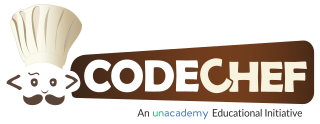
Code-Chef is an online educational program and competitive programming community of global programmers. Code-Chef started as an educational initiative in 2009 by Directi, an Indian software company. In 2020, it became owned by Unacademy.
Benjamin Qi is an American competitive programmer currently attending the Massachusetts Institute of Technology. He was the two-time winner of the International Olympiad in Informatics, the "most prestigious" high school competition for algorithmic programming, in 2018 and 2019. Qi is widely considered one of the top 10 competitive programmers in the world, along with other top sport programmers like Gennady Korotkevich, Petr Mitrichev, Makoto Soejima, and others. In December 2019, Qi also became one of the lead problem setters for the prestigious USA Computing Olympiad, whose competitions select the United States' team to the IOI. He is also the director for the USACO Guide, a leading website for studying for the USACO.
Makoto Soejima is a Japanese former competitive programmer. He is one of three people to have won both the Google Code Jam and the Facebook Hacker Cup and the only one to have also won a gold medal with a perfect score at the International Mathematical Olympiad (IMO). In International Science Olympiads, he has won three gold medals and one bronze in the International Mathematical Olympiad as well as two silver medals in the International Olympiad in Informatics (IOI).








